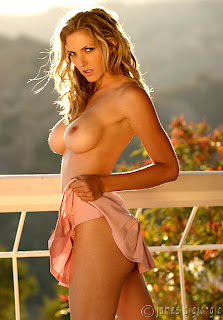 If your passion and appreciation for the craft of photography extends beyond enjoying pretty girl pics (and how those images are constructed) and enters the ethereal and intellectual realms of photography as art, you might
If your passion and appreciation for the craft of photography extends beyond enjoying pretty girl pics (and how those images are constructed) and enters the ethereal and intellectual realms of photography as art, you might Personally, I think the art and craft of photography is more alive and vibrant than ever, but what do I know?
The image of Roxanne, bathed in Southern California golden-hour light, is from 3 or 4 years ago. The sun and a single reflector were all that were needed for this capture.

5 comments:
Among the many replies I could make to the esteemed *coughmoroncough* Mr. Plagens, I offer simply this:
http://en.wikipedia.org/wiki/Cottingley_Fairies
"It all changed in the 70's..."
"Recently manipulated and pixellated to the point of extinction..."
Spoken like, to be blunt, an ignoramus. Specifically, Ignoramus retrogradi, or "crotchety old idiot."
M
Beautiful model and the photo shows how you don't need to a ton of studio lights to create a great image (just skill in seeing the light).
i saw your post below about location lighting - the hensel porty is great quality/use/desigh, but it's a bit delicate for heavy shooting. i travel a bit too much for it. it's going in to be repaired for the 3rd time since i got it in march.
needless to say, i'm switching to profoto.
great work as always btw!
Hell no photography is not dead. Whoever thinks that is a moron. In my opinion its evolving. Photoshop is just a tool that allows the photographer to be more creative.
By the way Jimmy, beautiful picture by you, as usual.
Photographs have always been "expressions" or interpretations of reality, just like any other medium.
The photographer makes determinations on when the scene is recorded, and at what angle, often with a choice of where the shadows and light fall, and frames/crops the world during exposure.
This alone "hides" what he doesn't want you to see, and shows what he does.
Of course, the choice of film, developing, selective dodging/burning, paper type, chemicals used, display, etc., all alter the reality that surrounded the camera during exposure.
So, now, we do these things with more flexible and precise manipulations.
We see with our minds, not our eyes. And now it's just a little easier to produce what our minds can visualize.
For fun, we can make rules and categorize photography according to predetermined limits on what tools and techniques can be used. This might make some people happy. Kind of like an artist saying, "I only used pencil on this piece, with no eraser." As opposed to someone who did a mixed media work.
Post a Comment